The Deborah Kerr Curtain Call Playhouse
A Fellowship League Foundation
Industry for the Performing ArtsHIGH and SOCIAL DRAMA Films
|
 |
|
|
|
|
|
|
|
|
|
|
|
|
|
|
|
|
|
|
 |
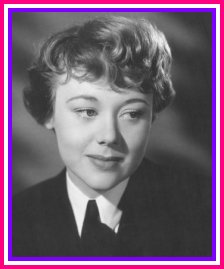
"Perfect Strangers"
NOTES and FACTS: Given the shortage and difficulties of film production in wartime England, and the fact that the Ministry of Supply was unwilling to vacate the Elstree studio, Sir Alexander Korda was hardput to make anything, let alone carry out the ambitious plans that he and L.B. Mayer had drawn up. Though he had sworn not to direct another movie himself, he made "Perfect Strangers," starring Robert Donat, Deborah Kerr, Ann Todd and Glynis Johns, which had a remarkable success in England and even did quite well in America, cosidering that it is a rather quiet English marital drama, but there could be no disguising tha fact that he spent over one million pounds with very little to show in the way of earnings, and in Culver City the lion began to growl."Vacation from Marriage" is the story of a lower-middle-class English couple (Robert Donat and Deborah Kerr), peace-time dimouts who are transformed by history. During the early reels they look as abject as gray greasepaint and a nice burlesque of stultified timidity can make them; and, in a comic-strip way, develop a good deal of pathos and quite a fierce little indictment of the kind of world which can evolve such creatures. Later on, in an easy travesty of a generally uneasy problem, they confront each other looking like movie stars. War is supposed to be the catalyst, the sportsman's bracer; and the film's chief weakness is its failure to show the briefly exalted couple sinking back, uncontrollably, under their peacetime stone. That might be an unbearably depressing movie; this one is unbearably inspiriting. Even without qualifiers or full honesty, it is good to see war credited with one of the few things it can possibly be credited with. But the real logic of the picture is that a large part of the human race is hardly fit for existence under any other circumstances. Vacation from Marriage PLEASANT ENGLISH COMEDY SHOWS HOW WARTIME SEPARATION IMPROVES A DULL AND UNHAPPY MARRIAGE During the war, social worriers have fretted about the effect of war on marriage. They were sure returning soldiers and their war-lonely wives would change so much during separation and end up incompatible with each other. VACATION FROM MARRIAGE, made in Metro-Goldwyn-Mayer's london studios, reverses this glum proposition. With a fine English sense of paradox, it shows how wartime absence and change actually improve a marriage.Robert and Catherine Wilson are played by Robert Donat and Deborah Kerr ( pronounced "Car" ). He is a mousy clerk in an exporting house and she a dowdy crosspatch with an eternal cold. The war interrupts their dreary marriage when both are called up, he into the Royal Navy and she into the Wrens. When their paths cross again in London after three years, time and their new, exciting lives hav worked a great change on both of the Wilsons. each carries a prewar image of the other and longs for divorce. The marriage nearly goes on the rocks before common sense begins to act. Robert Donat, long a favorite in America, remains an extraordinarily able actor. But US audiences will be attracted to Deborah Kerr, who became known as the three heroines of Colonel Blimp ( LIFE magazine, April 16th, 1945 ). One of the prettiest and most talented stars to appear in the last five years, Miss Kerr makes her change from the sniffling Mrs. Wilson to the attractive Wren a model of comedy technique in a highly pleasing film.
|
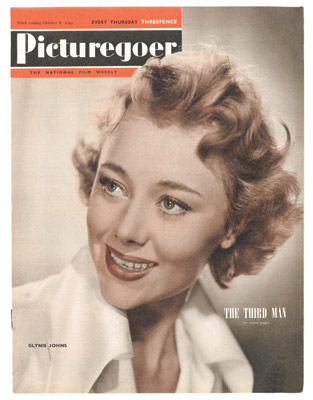
LIFE Magazine - April 8th, 1946
MOVIE OF THE WEEK:
"Vacation from Marriage" Until the war intrudes on their lives Robert and Catherine Wilson are a shabby couple who live completely by rote and habit in a London flat . . .
Robert goes overseas during the war and survives the sinking of his ship. In a hospital he falls mildly in love with his nurse(Ann Todd), shaves his grubby mustache and broods on how uninspiring and helpless his wife is . . .
Catherine stays in England on duty with the Wrens. She falls for a goodhearted naval architect (Roland Culver) but resolves not to divorce husband because of her belief that he would be completely unhappy without her . . .
Back in London Robert and Catherine are reunited. they are both shocked to discover that the war has made two completely different people out of them. Robert says he had always thought his wife was awful and Catherine admits that only obligation to poor Robert stands in the way of her marriage to the architect. They decide on divorce but give it up on gradual realization that the new Wilsons have a greater chance for happiness than the old ones. PLEASANT ENGLISH COMEDY
SHOWS HOW WARTIME SEPARATION
IMPROVES A DULL AND UNHAPPY MARRIAGE During the war, social worriers have fretted about the effect of war on marriage. They were sure returning soldiers and their war-lonely wives would change so much during separation and end up incompatible with each other. Vacation from Marriage, made in Metro-Goldwyn-Mayer's London studios, reverses this glum proposition. With a fine English sense of paradox, it shows how wartime absence and change actually improve a marriage.
Robert and Catherine Wilson are played by Robert Donat and Deborah Kerr (pronounced "Car"). He is a mousy clerk in an exporting house and she a dowdy crosspatch with an eternal cold. The war interrupts their dreary marriage when both are called up, he into the Royal Navy and she into the Wrens. When their paths cross again in London after three years, time and their new, exciting lives have worked a great change on both of the Wilsons. Each carries a prewar image of the other and longs for divorce. The marriage nearly goes on the rocks before common sense begins to act.
Robert Donat, long a favorite in America, remains an extraordinarily able actor. But U.S. audiences will be attracted to Deborah Kerr, who became known as the three heroines of Colonel Blimp (LIFE, April 16th, 1945), One of the prettiest and most talented stars to appear in the last five years, Miss Kerr makes her change from the sniffling Mrs. Wilson to the attractive Wren a model of comedy technique in a highly pleasing film. *~*~*~*~*~*~*~*~*~*~*~*~*~*~*~*~*~*~*~* War's Brighter Side One of the engaging things about "Vacation From Maggiage" is that, made in England during the war, it uses the war chiefly as an offstage agency dedicated to transforming a humdrum married couple into human beings.
Robert Wilson (Robert Donat) is a staid and stuffy Milquetoast whose youthful dreams of travel and grand adventure have dwindled in a world bounded in the dayime by his office and in the evening by an apartment furnished with one delicate wife, a clock that requires just as much attention, and additional depressing domestic appurtenances. Robert's wife, Catherine (Deborah Kerr), matches his stuffiness with her snuffiness. Catherine is a mousy creature afflicted with the perennial sniffles and is always avoiding drafts and blowing her nose.
Comes the war and Robert abandons his job and his umbrella, gives a last tick to the clock and an absent-minded kiss to Catherine, and somehow is accepted by His Majesty's Navy. A little later Catherine, bored beyond caring about her sniffles, finds herself roughing it with the Wrens. ( War's Brighter Side . . . continued in the writing below )
|
Vacation from Marriage is a warm, gentle, wise little British-in-war-time comedy, excellently acted by a British cast, excellently directed by Sir Alexander Korda.
The opening shot: a long, impersonal look across the slate roofs and smoking chimney pots of middle-class London. Barrage balloons ride high on their cables, and the sun is coming up over Europe and the Channel. Next comes a look through a grimy windowpane straight into the domestic life of Cathie and Robert Wilson.
Cathie ( Deborah Kerr ) represents wifely charm in a mousey woolen bathrobe, a muffler around her neck, sleep in her eyes, a cold in her nose. In an early-morning coma, Robert ( Robert Donat ) moves speechless and heavy-lidded about the drab little flat. First, the clean collar, the neat cravat. Then a cup of tea, a glance at the clock, a peek at the barometer, and down the stairs and off to his job as a bookkeeper, a symbol of hopeless, conventional timidity.
The war makes the Wilsons say a frightened goodbye to all that, taking Robert from his ledgers and stiff collars into the Royal Navy, leaving Cathie with nothing better to do than to close the flat and join the Woman's Royal Navy Service ( Wrens ). Thus begins their vacation from marriage. It ends some three years later in a transformation which may not strike hardened cinemaddicts as particularly surprising. But the picture holds together nicely, and without the customary Hollywood glue, goo and garnish.
Charming Cinemactress Kerr ( Major Barbara, Colonel Blimp ) plays the early, mousey Cathie as though she herself sniffled through breakfast every morning in bathrobe and muffler. She also looks miraculously fetching in the blue serge suit and black cotton stockings of a Wren. Versatile Cinemactor Donat ( The 39 Steps, Goodbye, Mr. Chips ) seems happy in what is probably the feest, freshest comedy role he has ever had, and grows young even more gracefully than he grew old in the James Hilton heartwringer.
Equal honors must go to Britain's Hungarian-born Producer-Director Sir Alexander Korda ( knighted by George VI in 1942 ), who gives to the story that air of authenticity and apparent artlessness which has become a sort of hallmark of the best British pictures.
|
War's Brighter Side - continuation...
In the course of becoming something of a hero, Robert learns to dance a bit, drink a bit, and recognize a pretty nurse ( Ann Todd ) when he sees one. Similarly, with the help of a sister Wren ( Glynis Johns ), Catherine spruces up, loses her sniffles, and even wins the attentions of an eligible admirer ( Roland Culver ).
Unfortunately, none of these sea changes is charted in the Wilson's carefully inhibited letters to each other, and when the time comes for their first reunion in three years, each is convinced that life with the other is impossible. The happy ending is of a piece with everything that has gone before, but so skillfully is this slight and leisurely story developed, and so persuasive are Donat and Deborah Kerr as the rejuvenated Wilsons, that "Vacation From Marriage" is pleasant entertainment from anybody on either side of the Atlantic.
Metro-Goldwyn-Mayer/London Films.
Alexander Korda, producer-director.
|
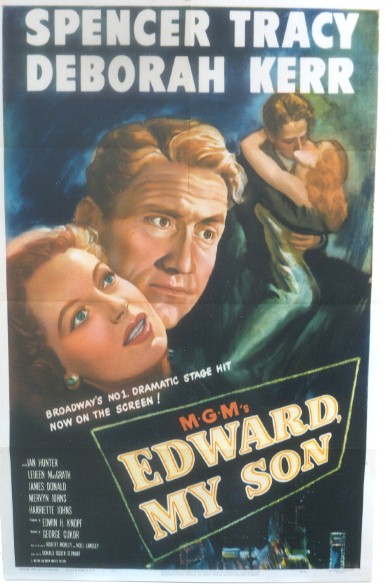
|
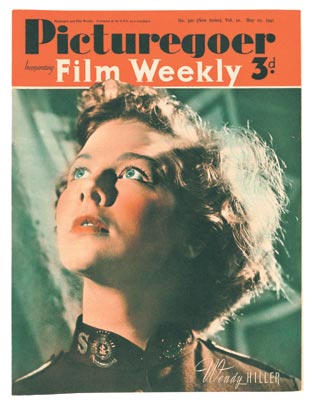
|
" Edward, My Son " 1949
|
|
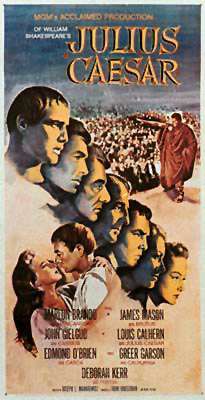 "JULIUS CAESAR"
"JULIUS CAESAR"
HAIL !
B / W. 1953. Play by William Shakespeare. DIR Joseph L. Mankiewicz
PROD John Houseman. M-G-M.
STARS Louis Calhern, Marlon Brando, James Mason, John Gielgud, Edmund O'Brien, Greer Garson, Deborah KerrA stirring, memorable filming of Shakespeare, not the easiest of movie tricks. But there is no trickery here in this striking flow of eloquent language blending with slightly set up meaningful movie imagery, as piloted by director Joseph L. Mankiewicz and with two superlative performances by John gielgud, as the feverishly rebellious and cunning Cassius, and Marlon Brando, with a fire-and-ice portrayal of Mark Antony, that alone would render the film worthwhile. Next comes James Mason, as Brutus, whose story this essentially is, though the drama tapers after Antony's famous speech, the battle scenes are stiff and the two ladies, Greer Garson and Deborah Kerr, seem merely fringe benefits.
|
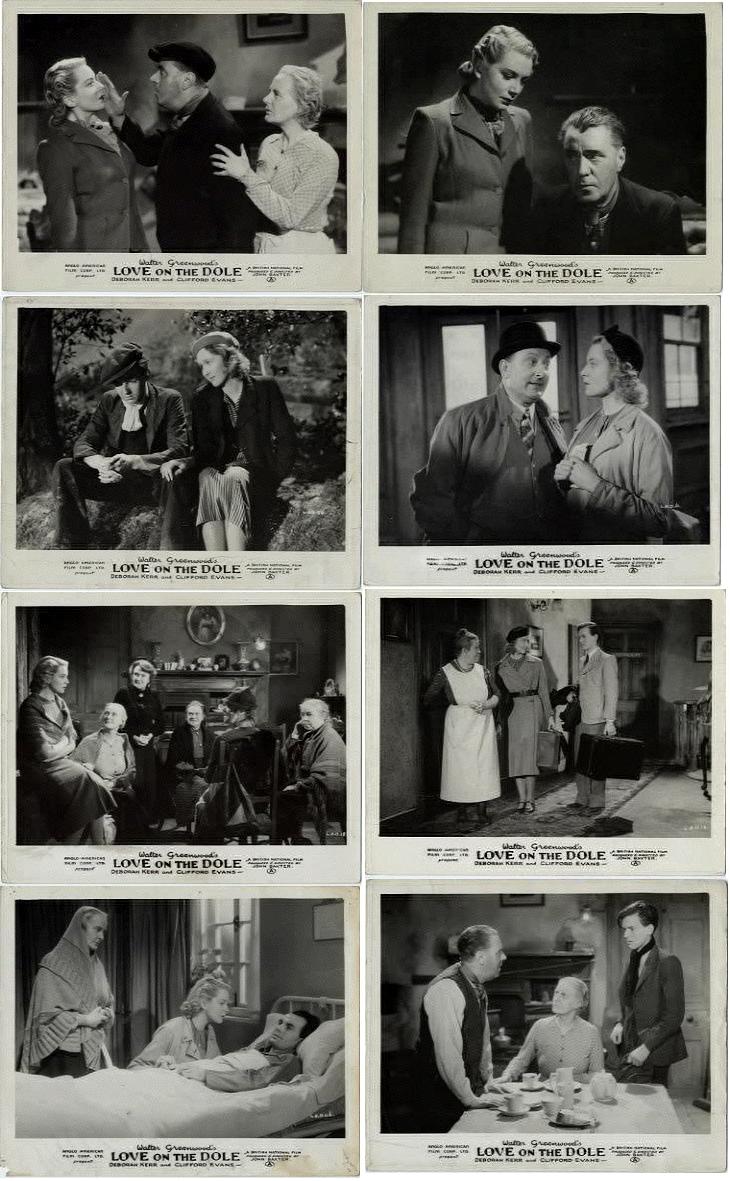
|
|
|
" LOVE ON THE DOLE " The grim whisper of despair that you will hear in "Love on the Dole," an English production with Deborah Kerr and Clifford Evans, is a more impressive sound than all the tumult and the shouting that have assailed your ears in the past half decade. In the squalor and gloom of an English mill town, the film finds, and takes a good look at, the consequences of wholesale and persistent unemployment on the life of a community already bogged down in poverty, and it listens with proper appreciation to the mutterings of men bewildered, hopeless, and threadbare. There isn't any burning torch of revolution here, and the preachments are few. But this unostentatious little picture manages to pose a mighty big problem.
There is nothing very original about the plot of "Love on the Dole." Certainly there have been plenty of stories before that have told the sad tale of the daughter of a poor family who tries to help the folks out by giving in to a Fancy Dan, only to find herself tossed out of the house by a father of a conventional turn of mind. But filling out this old-fashioned pattern are scenes with a very real wallop - the unemployed marching against a phalanx of cops, the unemployed being refused any help at the dole office, an adolescent and his girl viewing in wonderment the equipment of a seedy bathroom in a second-rate seaside rooming house, a group of furtive old harridans swigging a bottle in a musty parlor. The talk of these crones is good and gamy. Consoling the mother of the girl who fell from virtue, one of them, an undertaker by trade, points out brightly that, if she had to lead her life over again, she'd "never turn me nose up at a fat belly as long as it had a gold chain on it." Yet another, hearing that the labor leader of the piece has left instructions to have his body cremated, declares hoarsly, "If that's what them Socialists believe in, they're not getting my vote."
"Love on the Dole" has been a long time getting here. When the film was produced in England, in 1941, the government suppressed it on the ground that its indictment of conditions under the Tory Government of the early thirties was ill-timed. It was similarly unlucky in the United States, since the Hays Office professed to be horrified at the outspokenness of its dialogue. Now, with all the naughty words removed, it stacks up as "the most effective proletarian drama of the year," which was what Robert Benchley said in 1936 about the play it stems from.
|
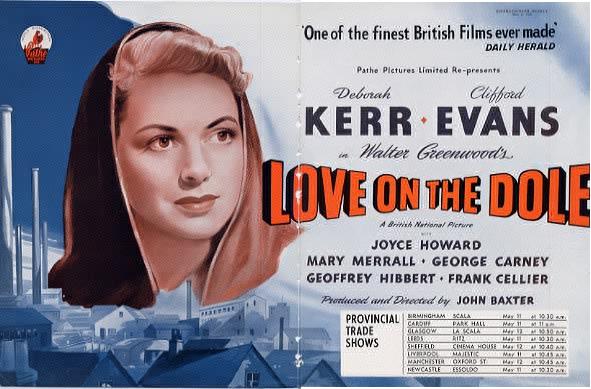
THEATRE ARTS - December, 1945 p710 Two recent importations from England bear the imprint of ' Four Continents Films ' , one of the few British companies that has not come under the domination of J. Arthur Rank. Love on the Dole was made several years back from Walter Greenwood's play, which, in turn, appeared on the American stage some years before that. It is a grim affair, but unfortunately not too grim to be close to the truth. Set in a British coal-mining town, it is the despairing story of a people, proud and hardworking, who are prevented from achieving even their modest demands on life by a constant round of circumstances that frustrate their mildest efforts to improve their lot. If Love on the Dole is transformed from being a merely gloomy record of ugly fact it is because of the forthrightness of its writing, the passionate simplicity of its acting and the fact that although it offers no happy ending, it does suggest that these people own, after all, a key to the solution of their ills. The answer is to exercise their power of voting with wisdom and discrimination, basing their decisions not - as they have in the past - on which candidate can supply an immediate load of coal, but on which can provide a program to lighten the heavy burden of poverty and degradation that plagues their neighbors and themselves.
Since the party recommended is the Labor Party, the previous delay and the current release of this four-year-old film are both explained. Deborah Kerr and Clifford Evans, Geoffrey Hibbert and Joyce Howard are the two young couples in love who bear the chief burden of the picture's theme; while a Greek chorus of tipsy old ladies (led by Marie Ault) contribute a running fire of lusty and pertinent comments.
The second Four Continents film is Battle for Music, an amateur project whose very ineptness is disarming. *~*~*~*~*~*~*~*~*~*~*~*~*~*~*~*~*~*~*~*~*~*~*~*~*~*~*~*~*~*~*~*~*~*~*~*~*~*~*~*~*~*~*
|
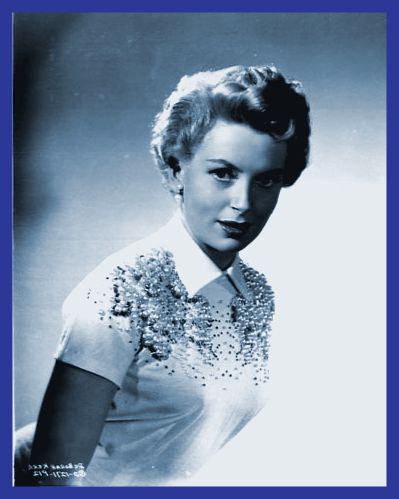
|
We make no money from this outstanding web site - whatever gave you such an idea - it's purely for the love of the s*t*a*r*s and their films.
|
|
|